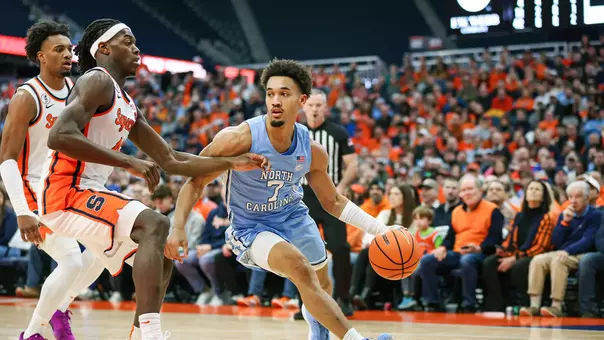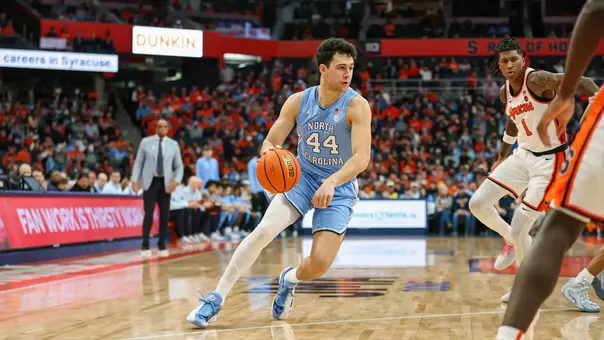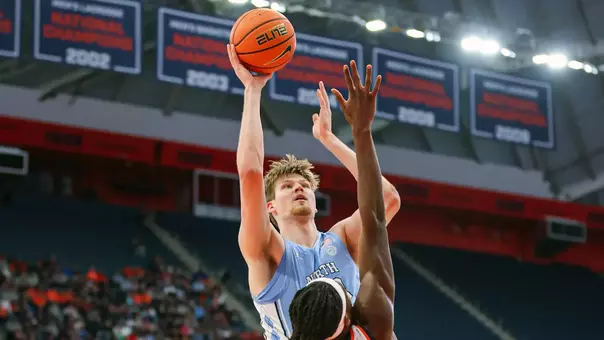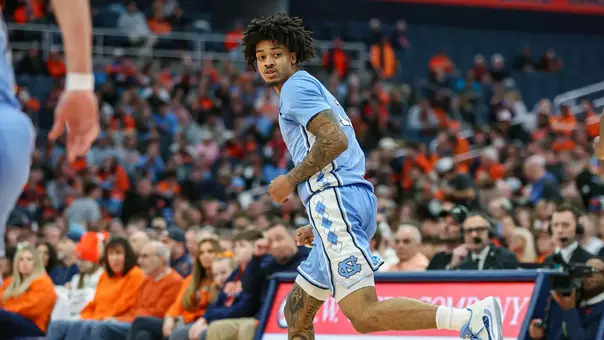University of North Carolina Athletics
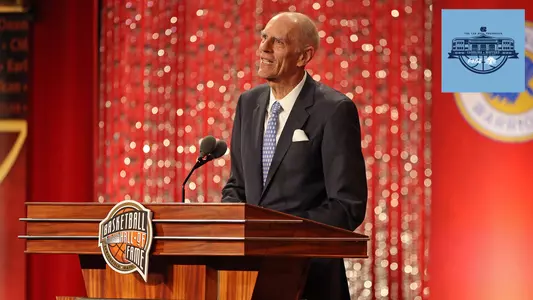
Bobby Jones was enshrined in the Naismith Hall of Fame in September 2019.
Photo by: Getty Images
GoHeels Exclusive: 'Great Memories' For Jones Upon Return
December 14, 2019 | Men's Basketball, Featured Writers
By Pat James, GoHeels.com
Thirty-three years removed from playing in his last NBA game, Bobby Jones was driving from Charlotte to Charleston, South Carolina, when he received the call he never expected last spring.
A standout at North Carolina in the early 1970s and a four-time NBA All-Star, Jones has always viewed the NBA as an offensive league. Most people tend to agree. And for the longest time, that seemed to include the voters who kept Jones, one of the NBA's greatest defensive players, from gaining entry into the Naismith Basketball Hall of Fame due to his modest offensive stats.
As Jones came to find out, though, voters for the Class of 2019 elected to add more weight to defensive awards. So, after narrowly missing out several times since his retirement in 1986, Jones learned in April he'd been selected for the game's ultimate honor.
"It was shocking to me," said Jones, who was named to the ABA's All-Defensive first team twice and the NBA's eight more times in a 12-year career. "It was hard to fathom."
Eight months later, it still is.
The seventh former UNC player and 11th Tar Heel overall to be elected to the Hall of Fame, Jones was officially inducted on Sept. 6. On Sunday at Carmichael Arena, Carolina will recognize him for that achievement during the game against Wofford.
"As I think about all the great players who have gone through that University, to be one of those guys to make it to the Hall of Fame is a blessing," Jones said. "I thank the Lord that He gave me not only the physical ability, but He put people in my life who really directed me to maximize what I could do in the game of basketball."
Jones has thought about them often the last eight months.
Initially, basketball didn't appeal to Jones. His father Bob, who played at Oklahoma, forced him to play on his church's league team as a child. Then, when the family moved to Charlotte when Jones was in sixth grade, Bob installed a hoop in their backyard.
Jones said his older brother Kirby, who also went on to play at Oklahoma, was more inclined to use it. But Bob ensured Jones did, too, assigning him drills to complete throughout the week as Bob traveled for his job with Goodyear.
"Those kinds of things I kind of resented at the time," Jones said. "But he's your dad, so you do what he tells you. I'm certainly appreciative now for all he did for me. He had the foresight to see I had pretty good hands and I could move fairly well and I was fairly tall for my age. He did really get me into it, even though I didn't really enjoy it at first."
Jones regularly attended Davidson games growing up, and also went to games at Duke and UNC. He liked all three teams equally. But ultimately, he committed to the Tar Heels.
Coming out of South Mecklenburg High, Jones said he "felt like there was a difference with" Carolina's coaches: John Lotz, Bill Guthridge and Dean Smith. During his recruitment, Jones formed a special bond with Lotz, who visited him at least once a week. In Guthridge, Jones saw someone who shared a similar quiet personality. And Smith couldn't be more sincere.
"I really felt like those men had my best interests at heart, and it proved to be that way," Jones said. "After I graduated, Coach Smith would still review my contracts with different teams that I signed with and medically he would help me find doctors I needed to find.
"It was a great fit for me to go to North Carolina."
After playing for Guthridge on the freshman team, Jones set an ACC single-season record in 1972 by shooting 66.8 percent from the floor. He led the league in field goal percentage the next two years, as well, making him one of two players in ACC history to lead the conference in field goal percentage in three consecutive seasons.
Jones' senior season in 1974 proved to be his best, as he earned first-team All-America and All-ACC honors. In his final game at Carmichael, he starred in UNC's famous "eight points in 17 seconds" comeback against Duke, scoring four points during the rally that sent the game into overtime. That wasn't his only shining moment against the Blue Devils that season. Earlier in the year, he stole an inbounds pass and made a layup at the buzzer to beat Duke in Durham.
Jones had started received national attention before that. As a sophomore, he had represented the U.S. in the 1972 Olympics, when the Americans lost controversially to the Soviet Union in the gold medal game.
In preparation for the Olympics, Jones said the U.S. practiced three times daily. Those practices, however, weren't nearly as difficult as the ones he endured with the Tar Heels. Just the sight of the word "conditioning" on a Carolina practice plan would cause Jones to break out into a cold sweat. But learning what it took to take care of his body proved just as important as the lessons UNC's coaches taught him in playing help-side defense and being on time.
"It was just the perfect training ground for the next level for me," he said.
Jones began his professional career with the ABA's Denver Nuggets, then coached by fellow Tar Heel and Hall of Famer Larry Brown. In four seasons under Brown, Jones was an ABA All-Star in 1976 and an NBA All-Star in 1977 and 1978. The Nuggets then traded him to the Philadelphia 76ers before the 1978-79 season.
Jones would spend his final eight NBA seasons in Philadelphia, the first seven of which he was coached by another UNC Hall of Famer, Billy Cunningham. Overall, Brown and Cunningham coached Jones in 11 of his 12 seasons.
"I look back on my career and I think if I'd gone to a different team, it's easy to get lost in the crowd," Jones said. "But Coach Smith had shared with them (Brown and Cunningham) what my strengths were and what my weaknesses were, and I fit in on those teams.
"It was really a lot of fun, especially with Billy. He was such a competitor, hated to lose. It was fun to have winning teams there (in Philadelphia)."
The 76ers won 47 games or more in each season of Jones' tenure and made the NBA Finals three times. Twice, in 1980 and 1982, they lost to the Los Angeles Lakers in six games. But in 1983, Jones teamed with Maurice Cheeks, Julius Erving and new addition Moses Malone to sweep the Lakers for Philadelphia's third championship.
"We all felt like with Moses on our team, we had no reason not to win," said Jones, who won the NBA's inaugural Sixth Man of the Year award that same season. "I think it was one of the few teams I was on that everybody was unselfish. We had a common purpose and that was to play as hard as we could every night and dominate as much as we could."
For Jones especially, both those things went hand in hand.
Jones' time in the NBA helped him truly understand how aggressive the players are. Play defense hoping something bad won't happen, it surely will, he said. But Jones never thought that way. Instead, he focused on doing whatever possible to keep his man from doing what he wanted.
"I always describe NBA basketball, from my perspective, as manual labor, mostly night work," Jones said. "That's what it was for me. I wasn't a guy who was going to go out there and go from elbow to elbow and shoot jumpers. I was the guy who was going to deny the guy the ball and box out and sprint out on the break and hustle back on defense. It was work."
Since retiring, Jones has lived in Charlotte. He's done speaking engagements for the Fellowship of Christian Athletes and other ministries, and gone on several mission trips. He's also coached basketball at various levels, but decided not to this year so he could spend more time with his grandchildren.
All seven of them, as well as his three children, their spouses and his wife, will be joining him at Sunday's game. That it's being held in Carmichael, the same facility he once played in, makes it even more special.
"I love going back there," Jones said. "My daughter (Meredith) played volleyball there (14 years ago), so I would go back and watch them in Carmichael. I just love sitting in there. It's just a friendly place of great memories for me."
Sunday will surely bring another in a year full of them.
Thirty-three years removed from playing in his last NBA game, Bobby Jones was driving from Charlotte to Charleston, South Carolina, when he received the call he never expected last spring.
A standout at North Carolina in the early 1970s and a four-time NBA All-Star, Jones has always viewed the NBA as an offensive league. Most people tend to agree. And for the longest time, that seemed to include the voters who kept Jones, one of the NBA's greatest defensive players, from gaining entry into the Naismith Basketball Hall of Fame due to his modest offensive stats.
As Jones came to find out, though, voters for the Class of 2019 elected to add more weight to defensive awards. So, after narrowly missing out several times since his retirement in 1986, Jones learned in April he'd been selected for the game's ultimate honor.
"It was shocking to me," said Jones, who was named to the ABA's All-Defensive first team twice and the NBA's eight more times in a 12-year career. "It was hard to fathom."
Eight months later, it still is.
The seventh former UNC player and 11th Tar Heel overall to be elected to the Hall of Fame, Jones was officially inducted on Sept. 6. On Sunday at Carmichael Arena, Carolina will recognize him for that achievement during the game against Wofford.
"As I think about all the great players who have gone through that University, to be one of those guys to make it to the Hall of Fame is a blessing," Jones said. "I thank the Lord that He gave me not only the physical ability, but He put people in my life who really directed me to maximize what I could do in the game of basketball."
Jones has thought about them often the last eight months.
Initially, basketball didn't appeal to Jones. His father Bob, who played at Oklahoma, forced him to play on his church's league team as a child. Then, when the family moved to Charlotte when Jones was in sixth grade, Bob installed a hoop in their backyard.
Jones said his older brother Kirby, who also went on to play at Oklahoma, was more inclined to use it. But Bob ensured Jones did, too, assigning him drills to complete throughout the week as Bob traveled for his job with Goodyear.
"Those kinds of things I kind of resented at the time," Jones said. "But he's your dad, so you do what he tells you. I'm certainly appreciative now for all he did for me. He had the foresight to see I had pretty good hands and I could move fairly well and I was fairly tall for my age. He did really get me into it, even though I didn't really enjoy it at first."
Jones regularly attended Davidson games growing up, and also went to games at Duke and UNC. He liked all three teams equally. But ultimately, he committed to the Tar Heels.
Coming out of South Mecklenburg High, Jones said he "felt like there was a difference with" Carolina's coaches: John Lotz, Bill Guthridge and Dean Smith. During his recruitment, Jones formed a special bond with Lotz, who visited him at least once a week. In Guthridge, Jones saw someone who shared a similar quiet personality. And Smith couldn't be more sincere.
"I really felt like those men had my best interests at heart, and it proved to be that way," Jones said. "After I graduated, Coach Smith would still review my contracts with different teams that I signed with and medically he would help me find doctors I needed to find.
"It was a great fit for me to go to North Carolina."
After playing for Guthridge on the freshman team, Jones set an ACC single-season record in 1972 by shooting 66.8 percent from the floor. He led the league in field goal percentage the next two years, as well, making him one of two players in ACC history to lead the conference in field goal percentage in three consecutive seasons.
Jones' senior season in 1974 proved to be his best, as he earned first-team All-America and All-ACC honors. In his final game at Carmichael, he starred in UNC's famous "eight points in 17 seconds" comeback against Duke, scoring four points during the rally that sent the game into overtime. That wasn't his only shining moment against the Blue Devils that season. Earlier in the year, he stole an inbounds pass and made a layup at the buzzer to beat Duke in Durham.
Jones had started received national attention before that. As a sophomore, he had represented the U.S. in the 1972 Olympics, when the Americans lost controversially to the Soviet Union in the gold medal game.
In preparation for the Olympics, Jones said the U.S. practiced three times daily. Those practices, however, weren't nearly as difficult as the ones he endured with the Tar Heels. Just the sight of the word "conditioning" on a Carolina practice plan would cause Jones to break out into a cold sweat. But learning what it took to take care of his body proved just as important as the lessons UNC's coaches taught him in playing help-side defense and being on time.
"It was just the perfect training ground for the next level for me," he said.
Jones began his professional career with the ABA's Denver Nuggets, then coached by fellow Tar Heel and Hall of Famer Larry Brown. In four seasons under Brown, Jones was an ABA All-Star in 1976 and an NBA All-Star in 1977 and 1978. The Nuggets then traded him to the Philadelphia 76ers before the 1978-79 season.
Jones would spend his final eight NBA seasons in Philadelphia, the first seven of which he was coached by another UNC Hall of Famer, Billy Cunningham. Overall, Brown and Cunningham coached Jones in 11 of his 12 seasons.
"I look back on my career and I think if I'd gone to a different team, it's easy to get lost in the crowd," Jones said. "But Coach Smith had shared with them (Brown and Cunningham) what my strengths were and what my weaknesses were, and I fit in on those teams.
"It was really a lot of fun, especially with Billy. He was such a competitor, hated to lose. It was fun to have winning teams there (in Philadelphia)."
The 76ers won 47 games or more in each season of Jones' tenure and made the NBA Finals three times. Twice, in 1980 and 1982, they lost to the Los Angeles Lakers in six games. But in 1983, Jones teamed with Maurice Cheeks, Julius Erving and new addition Moses Malone to sweep the Lakers for Philadelphia's third championship.
"We all felt like with Moses on our team, we had no reason not to win," said Jones, who won the NBA's inaugural Sixth Man of the Year award that same season. "I think it was one of the few teams I was on that everybody was unselfish. We had a common purpose and that was to play as hard as we could every night and dominate as much as we could."
For Jones especially, both those things went hand in hand.
Jones' time in the NBA helped him truly understand how aggressive the players are. Play defense hoping something bad won't happen, it surely will, he said. But Jones never thought that way. Instead, he focused on doing whatever possible to keep his man from doing what he wanted.
"I always describe NBA basketball, from my perspective, as manual labor, mostly night work," Jones said. "That's what it was for me. I wasn't a guy who was going to go out there and go from elbow to elbow and shoot jumpers. I was the guy who was going to deny the guy the ball and box out and sprint out on the break and hustle back on defense. It was work."
Since retiring, Jones has lived in Charlotte. He's done speaking engagements for the Fellowship of Christian Athletes and other ministries, and gone on several mission trips. He's also coached basketball at various levels, but decided not to this year so he could spend more time with his grandchildren.
All seven of them, as well as his three children, their spouses and his wife, will be joining him at Sunday's game. That it's being held in Carmichael, the same facility he once played in, makes it even more special.
"I love going back there," Jones said. "My daughter (Meredith) played volleyball there (14 years ago), so I would go back and watch them in Carmichael. I just love sitting in there. It's just a friendly place of great memories for me."
Sunday will surely bring another in a year full of them.
WBB: Post-Pitt Press Conference - Feb. 22, 2026
Sunday, February 22
UNC Women's Basketball: Three-Ball Powers Carolina Past Pitt, 78-50
Sunday, February 22
UNC Women's Lacrosse: Tar Heels Run Through Cardinals, 24-3
Sunday, February 22
UNC Softball: Tar Heels Stay Hot in Win vs Princeton, 5-2
Saturday, February 21










